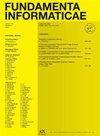异步多方会话的全局类型和事件结构语义
IF 0.4
4区 计算机科学
Q4 COMPUTER SCIENCE, SOFTWARE ENGINEERING
引用次数: 0
摘要
我们建议将具有异步通信功能的多方会话解释为流事件结构。我们为这种会话引入了一个新的异步类型概念,确保多方会话的预期属性,包括进度。我们的异步类型比标准的全局类型更直接、更精确地反映了异步性,而且更具有许可性,其本身可解释为 "主事件结构"。主要结果是,当会话可类型化时,会话的事件结构解释等同于其异步类型的事件结构解释,即它们的配置域是同构的。本文章由计算机程序翻译,如有差异,请以英文原文为准。
Global Types and Event Structure Semantics for Asynchronous Multiparty Sessions
We propose an interpretation of multiparty sessions with asynchronous communication as Flow Event Structures. We introduce a new notion of asynchronous type for such sessions, ensuring the expected properties for multiparty sessions, including progress. Our asynchronous types, which reflect asynchrony more directly and more precisely than standard global types and are more permissive, are themselves interpreted as Prime Event Structures. The main result is that the Event Structure interpretation of a session is equivalent, when the session is typable, to the Event Structure interpretation of its asynchronous type, namely their domains of configurations are isomorphic.
求助全文
通过发布文献求助,成功后即可免费获取论文全文。
去求助
来源期刊

Fundamenta Informaticae
工程技术-计算机:软件工程
CiteScore
2.00
自引率
0.00%
发文量
61
审稿时长
9.8 months
期刊介绍:
Fundamenta Informaticae is an international journal publishing original research results in all areas of theoretical computer science. Papers are encouraged contributing:
solutions by mathematical methods of problems emerging in computer science
solutions of mathematical problems inspired by computer science.
Topics of interest include (but are not restricted to):
theory of computing,
complexity theory,
algorithms and data structures,
computational aspects of combinatorics and graph theory,
programming language theory,
theoretical aspects of programming languages,
computer-aided verification,
computer science logic,
database theory,
logic programming,
automated deduction,
formal languages and automata theory,
concurrency and distributed computing,
cryptography and security,
theoretical issues in artificial intelligence,
machine learning,
pattern recognition,
algorithmic game theory,
bioinformatics and computational biology,
quantum computing,
probabilistic methods,
algebraic and categorical methods.
 求助内容:
求助内容: 应助结果提醒方式:
应助结果提醒方式:


